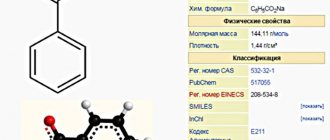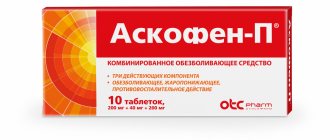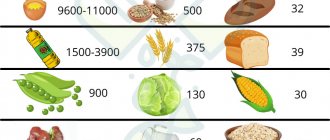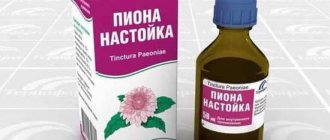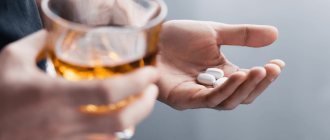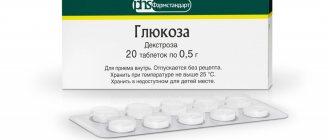Corvalol
- a combination drug consisting of several active ingredients. The composition of Corvalol is as follows (starting with the strongest component and ending with the weakest):
- Ethyl alcohol 95%
. According to many doctors, this is almost the main active ingredient of Corvalol. Ethyl alcohol (aka alcohol) has a sedative (calming, inhibitory) effect on the nervous system, and through it on the entire body. Its second effect is an analgesic, and this effect applies to all types of pain. In large doses it can cause a state of anesthesia with complete loss of consciousness and pain sensitivity. It is a psychoactive substance that can change and darken consciousness and cause mental and physical dependence. - Phenobarbital
. Sleeping substance. Just like alcohol, it has an inhibitory effect on the central nervous system, causing a decrease in pain sensitivity. The second most powerful active ingredient (after ethyl alcohol) is Corvalol. Just like ethyl alcohol, it is a psychoactive substance and can cause addiction. When combined with alcohol, phenobarbital produces a strong sedative effect that affects all psychosomatic symptoms. - Peppermint leaf oil
. The main component is menthol, which provides a slight analgesic and calming effect. - Ethyl bromoisovalerianate
(ethyl ester of alpha-bromoisovaleric acid). It is the active ingredient of the essential oil of a plant such as Valerian officinalis (or “Cat grass”). This perennial herb has been known for its calming effects since antiquity.
Available in bottles of 15 and 25 milliliters. The recommended dose of Corvalol is 15-30 drops orally at a time, up to 2 or 3 times a day.
Medicines similar to Corvalol are common in our country: valocordin, valoserdin, corvaldin.
The effect of Corvalol and what it helps with
The main effect of the drug is a sedative effect. Additional actions include dilating small blood vessels, relieving spasms, and reducing muscle tone. The benefit (therapeutic effect) of Corvalol is its rapid sedative and analgesic effect. This is useful for reactions to stress and mental trauma, neurotic conditions, and all types of psychosomatic diseases: hypertension, palpitations, asthma attacks, a feeling of a lump in the throat, irritable bowel syndrome, itchy skin and rashes.
Corvalol is not classified as a potent drug (despite the fact that it contains them) and therefore can be easily purchased at a pharmacy without a doctor's prescription. According to the DSM Group and the RBC portal, Corvalol is one of the best-selling drugs in the country in terms of the number of packages, second only to some painkillers.
According to surveys of doctors, it is extremely rarely recommended for use for therapeutic purposes, and only as a one-time (one-time) dose. From which we can conclude that the majority of purchased Corvalol is not used as prescribed by a doctor.
What is the reason for such a widespread use of Corvalol (and its analogues - valocordin, valoserdin)?
In our opinion, there are three main reasons
- Long-term history of admission. The drug has been known since “Soviet times”. Due to the fact that phenobarbital in combination with alcohol has a strong inhibitory effect on the nervous system, after taking Corvalol, the severity of symptoms of psychosomatic origin decreases. This is where the illusion arises that the drug helps with almost all diseases: from hypertension to alcohol hangover, from heart pain to seizures. That is, due to the specificity of its action, Corvalol can cause relief (albeit temporary) in many painful conditions.
- Lack of accessible, reliable other sedatives. Psychiatric illiteracy of the population. Low appeal to psychotherapists and psychiatrists. Often, with many mental disorders caused by overexcitation of the nervous system (reaction to stress, neuroses, psychosomatic diseases, insomnia, etc.), people do not turn to a specialist psychotherapist, but tend to seek relief by taking some kind of universal sedative.
- A large number of people dependent on Corvalol. Also, people with alcohol addiction often use alcohol-containing medications as a substitute for alcoholic beverages, using Corvalol, Valocordin, tinctures of hawthorn, valerian, motherwort, etc. Dependence on Corvalol has all the signs of drug addiction: mental, then physical dependence on Corvalol is formed. According to the observations of psychiatrists and psychiatrists - narcologists, there are a lot of Corvalol addicts among adults and elderly people.
Tachycardia: causes and signs. How to treat?
Tachycardia, along with a heart attack, is considered the “heart” disease of our century. It can be primary if it is a manifestation of ischemia, heart defects and chronic lung diseases - bronchitis, bronchial asthma.
The rapid heart rate (more than 90 beats/minute), which characterizes this heart disease, can be a consequence of frequent stress, fear, anxiety, and even simple physical activity. In this case, tachycardia is considered secondary.
The type of tachycardia can be determined by echo monitoring , ECG, ultrasound of the heart and thyroid gland. If the test result is negative, tachycardia is secondary.
If there is a sharp increase in heart rate that lasts for 10-15 minutes, you must immediately take a sedative - valocordin, Corvalol with water or sugar, put glycine under the tongue, drink tincture of valerian, mint or lemon balm. It may also be helpful to place a damp cloth or cold cloth on your forehead or neck.
With anemia, tachycardia is also possible, since with low hemoglobin, the blood supply to the tissues decreases, and the heart begins to contract faster to compensate for the lack of oxygen in the tissues. For anemia, it is necessary to consume iron supplements and vitamin C.
How to quickly stop tachycardia? Tachycardia is considered a normal phenomenon in adolescents during a period of active growth, and is also not excluded at elevated body temperatures: 70-80 pulse beats per minute at temperatures up to 39 degrees is absolutely normal. At a temperature above 39 degrees, you need to take Coldrex or paracetamol to bring it down, since with an increased heartbeat the body quickly gets tired.
Secondary tachycardia can be pacified with a variety of herbal infusions. For its long-term treatment, you can prepare a decoction of lemon balm, mint and valerian, pour 2 tbsp. spoons of herbs 0.5 liters of boiling water for 5-10 minutes and take the infusion for 2-3 weeks.
To reduce the release of adrenaline, you can put half a tablet of mezapam or phenazepam under your tongue.
It is better to replace evening coffee or tea with soothing infusions of rosehip and motherwort, which lower blood pressure.
Doctors do not advise getting carried away with valerian: take no more than 1 tablet 3 times a day for 10 days. You don't need excessive sleepiness, do you? For people for whom sleeping at work is contraindicated, we can recommend 1 tablet of Grandaxin under the tongue 2 times a day.
Cardiovascular drugs such as mildronate, trental or teopeca, which stimulate blood flow, can cause tachycardia. Alcoholic drinks of any strength can also become tachycardia stimulants, along with unusual and spicy foods.
Your fiery engine cannot forever “take the rap” for your frivolous attitude towards health. Get a preventive examination from a cardiologist , take care of your heart, and it will serve you for many years.
Harm of Corvalol.
With a single dose, the harm of Corvalol can only consist of possible allergic reactions, increased inhibitory effects of other medications taken, and overdose when taken in large doses. The main danger lies in cases of long-term and constant use of Corvalol. In such cases, the nervous system suffers: toxic encephalopathy develops with sleep disturbances, memory loss (even dementia), polyneuropathy; when Corvalol is withdrawn, convulsions and a withdrawal state with psychosis may develop. Long-term use of Corvalol is harmful with a high risk of developing mental and physical dependence, because, as written above, it contains two strong psychoactive substances: ethyl alcohol and phenobarbital. Treatment of encephalopathy and addiction caused by Corvalol may require hospitalization.
In conclusion, I would like to point out that medications should be taken only as prescribed by a doctor. Self-medication is dangerous!
Corvalol contains two strong psychotropic components: ethyl alcohol and phenobarbital. With constant use, it causes dependence and the need to take larger and larger doses, and after stopping its use or reducing the dose, withdrawal syndrome develops. Be careful with Corvalol and you will be healthier!
Content:
- Doctors' attitude
- Compound
- Indications
- Contraindications
- Overdose
- Other unpleasant consequences
- Development of addiction
Corvalol is one of the most widely known and frequently used drugs. It is especially popular among representatives of the older age group. Sold in tablets and drops. Traditionally used for discomfort in the heart, but in fact it is a sedative and primarily regulates the functioning of the central nervous system. Not as harmless as it might seem. The consequence of long-term use of Corvalol can be the development of unpleasant side effects and even addiction.
Overdose
The following complications can result from consuming Corvalol in large quantities:
- Reduced blood pressure. Along with dizziness, weakness and fainting, renal filtration may slow down against this background, which can lead to the development of oliguria. The likelihood of this negative consequence increases with kidney disease and initial hypotension.
- Slow reaction and deterioration of coordination of movements. It is especially dangerous for people operating moving machinery. May cause traffic accidents and industrial accidents. In the elderly, it increases the likelihood of falls and, as a result, fractures due to osteoporosis.
Long-term use causes a feeling of constant fatigue, trembling limbs, the appearance of depressive moods, deterioration of memory and the ability to concentrate. Due to addiction, patients gradually increase the dose. The drug has a cumulative effect, that is, it accumulates in the body, so symptoms of poisoning with regular use can occur even after the next dose of the usual dose.
There is no indication in the official instructions that the simultaneous consumption of alcohol is prohibited. However, statistics confirm the presence of unwanted reactions and dangerous complications due to the combined use of Corvalol and alcoholic beverages. Cases of coma and death have been described.
Doctors' attitude
Experts assess the need and benefits of the drug differently. Some doctors believe that due to the presence of phenobarbital, which is part of the group of barbiturates, the drug should be included in the prescription list. Uncontrolled use can cause serious side effects, poisoning and addiction. Another argument in favor of this position is that the medicine temporarily relieves symptoms but does not cure anything. Because of this, patients with serious pathologies do not seek medical help on time.
Other doctors indicate that the remedy benefits a large number of people. It relieves pain in mild myocardial ischemia and has a fairly pronounced antiarrhythmic effect. In addition, it has a beneficial effect on the condition of patients with cardioneurosis, a widespread disease in which heart pain is caused by psychological factors. And it is very inexpensive, which is important for older people, who are the main group of consumers.
Indications
The medicine is indicated when functional disorders occur and is ineffective when there are pronounced organic changes. It can be taken for anxiety, a slight jump in blood pressure, agitation, irritability, vegetative disorders (weakness, redness of the skin, excessive sweating).
The drug can be used occasionally to facilitate falling asleep, but sleep is not entirely physiological, so regular use for this purpose is undesirable. The medication helps relieve intestinal spasms, but this effect is insignificant.
Other Adverse Effects
Self-medication when refusing examination and qualified medical care can lead to delayed diagnosis of serious diseases, worsening the prognosis and increasing the likelihood of developing serious complications: hypertensive crises, strokes, heart attacks.
Some patients, even with a diagnosis and prescribed treatment, continue to prefer Corvalol, as a well-known and fast-acting remedy. However, unlike antiplatelet agents, antihypertensive drugs or statins, the drug does not affect the mechanisms of development of disorders in any way - it only masks existing symptoms.
Don't forget about habit and the placebo effect. With constant use, the next dose in itself becomes a calming ritual and looks like taking care of your health. The apparent effectiveness of treatment may be due to psychological factors, and not at all to the effect of the drug. It turns out that a person is in vain poisoning his body with barbiturates, but does not receive the necessary treatment.
